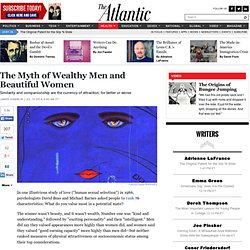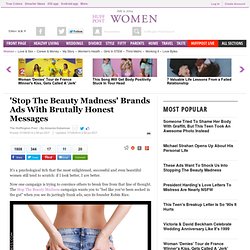

The Myth of Wealthy Men and Beautiful Women - James Hamblin. Similarity and companionship are the currency of attraction, for better or worse.

In one illustrious study of love (“human sexual selection”) in 1986, psychologists David Buss and Michael Barnes asked people to rank 76 characteristics: What do you value most in a potential mate? The winner wasn’t beauty, and it wasn’t wealth. Number one was "kind and understanding," followed by "exciting personality" and then "intelligent. " Men did say they valued appearances more highly than women did, and women said they valued "good earning capacity" more highly than men did—but neither ranked measures of physical attractiveness or socioeconomic status among their top considerations. People, though, are liars. While people tend to prefer people similar to themselves in terms of traits like religiousness or thriftiness, when it comes to beauty and income, more is almost always seen as better.
All you need is money or power, the notion goes, and beautiful lovers present themselves to you for the taking. 10 Ways to Feel Better About How You Look. Evdokimov Maxim/Shutterstock Have you ever been startled by catching your reflection in a store mirror or window?

You hadn’t realized, perhaps, that your face looks quite so stern or your hair (or roots) so gray. Try as we might to focus on people’s inner qualities, it’s difficult not to have at least some preoccupation with the way we, and others, appear. Some individuals go so far in emphasizing their appearance as to base much of their self-esteem on how good they think they look. Individuals high in what psychologists call appearance-contingent self-worth will go to great lengths to maintain what they consider an attractive look. Separate from appearance-contingent self-worth is your appearance self-esteem—the feelings of satisfaction you have with the way you look.
Aging presents a particular challenge for women’s appearance self-esteem because with each passing year, the media define their beauty as fading away. Throw away your conventional, media-defined ideals of beauty. Maigrir : pourquoi une telle obsession ? Le souci de la minceur semble n’épargner personne.

Et il fait endurer à notre corps une véritable éthique de la restriction. Nul n’y échappe. Des couvertures de magazines féminins aux affiches publicitaires en passant par les recommandations diététiques diffusées à la télévision, l’incitation au régime et à la restriction alimentaire contribue chaque jour davantage à asseoir le culte de la minceur comme l’idéal esthétique de la société contemporaine. La beauté se confond désormais avec l’image d’un corps svelte, longiligne, dépourvu d’adiposité, dissociant de plus en plus norme sociale et norme médicale. 'Stop The Beauty Madness' Brands Ads With Brutally Honest Messages. It's a psychological itch that the most enlightened, successful and even beautiful women still tend to scratch: if I look better, I am better.

Now one campaign is trying to convince others to break free from that line of thought. The Stop The Beauty Madness campaign wants you to "feel like you've been socked in the gut" when you see its jarringly frank ads, says its founder Robin Rice. Stop The Beauty Madness is a series of 25 advertisements branded with honest messages that highlight the true "madness" involved in creating and meeting beauty standards.
Rice, an author and the founder of Be Who You Are Productions, started the campaign to challenge an internalized belief that a woman's beauty determines her value. Rather than attempt to fit more diverse types of women into an already narrow definition of beauty, Stop The Beauty Madness questions the value we place on beauty in the first place. Beauty, Rice reminds us, can be both meticulously arranged or totally accidental. It’s Time We Retire The Statement “A Real Woman.” Isn’t It? Do you see the image above?

Is it really portraying an unbiased message? Not really. In many cases the new trend is to focus on the fact that we have become culturally obsessed with skinny and slim, to the point that we say that curvy women are real women while skinny women are not. But is this true? Last time I checked, the word “real” referred to something actually existing as a thing or occurring in fact; it’s not something that is imagined or supposed. In all seriousness, a real woman, and even a real man, is whoever we are. Imagine for an instant that we suddenly went the other direction completely and now “real” means being curvy. The image above is from Dove’s “Real Beauty” campaign.
Health Considered All of these concerns aside, I will admit that I don’t want the idea of removing what a “real woman” is to mean that all health concerns go out the window. 7 Diet Rules Science Says You Should Stop Following. Do You Look Fat in That? Who Cares? 5 Minutes of what the media actually does to women.